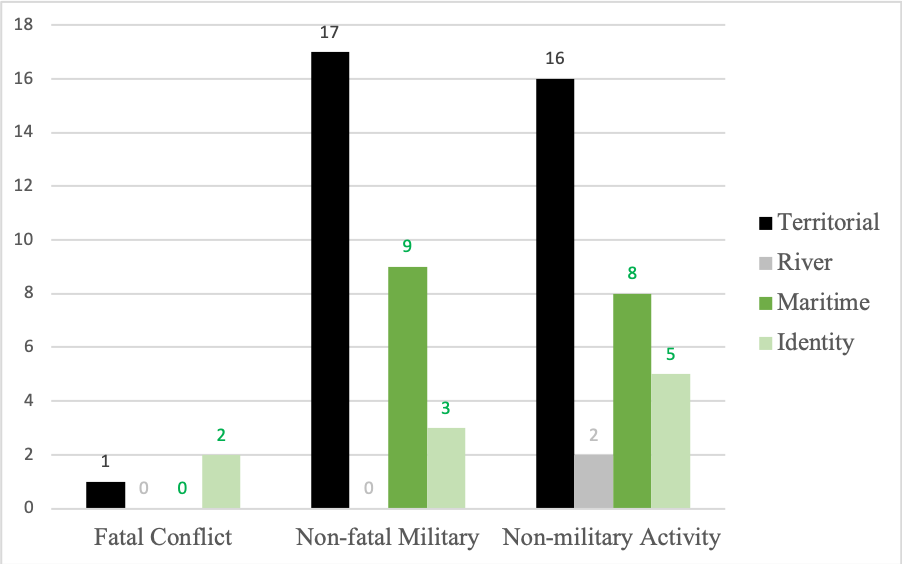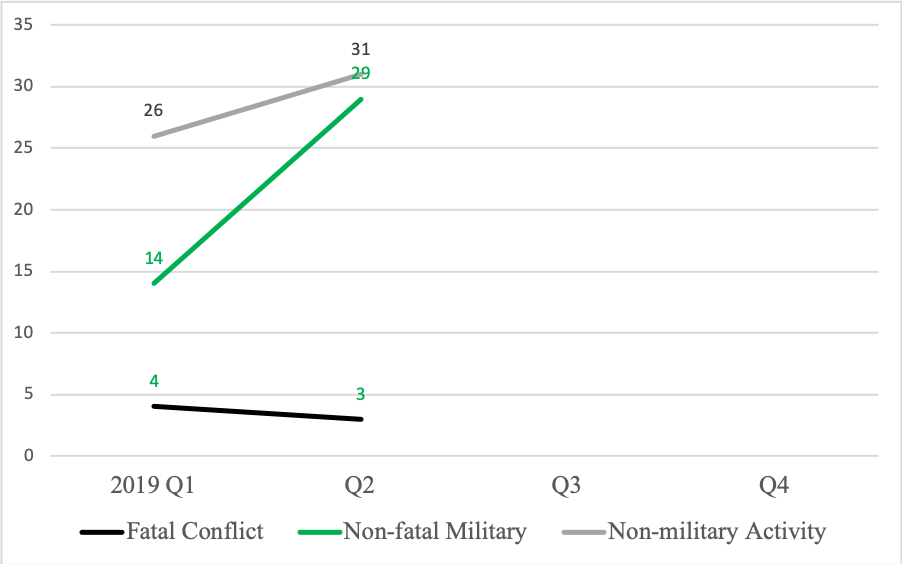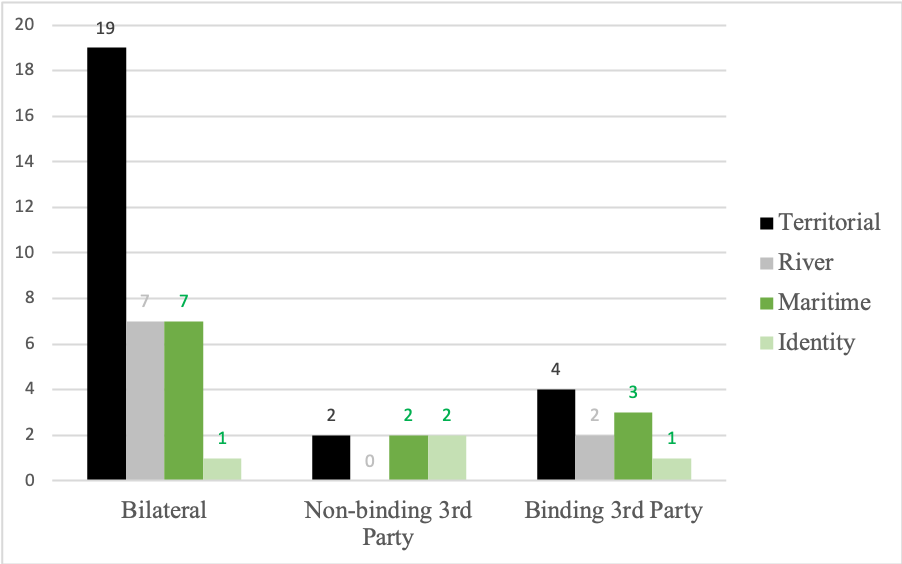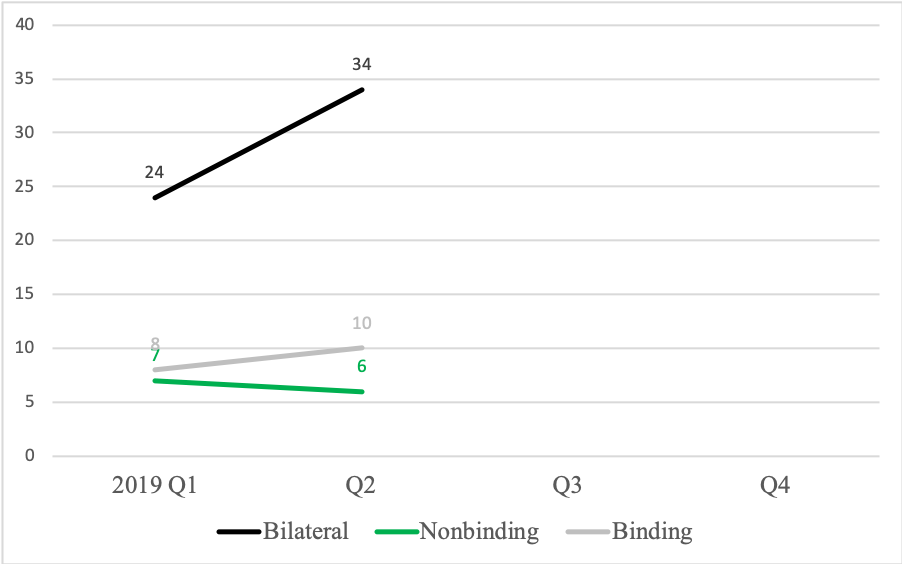April-June 2019: Overview of Events during Quarter
This is the second of a series of quarterly reviews of major events related to international conflict and cooperation, summarizing major events in the news from the past three months. We focus on conflict and cooperation between countries that disagree over specific types of contentious issues, in order to track how countries choose to manage, escalate, or settle their disagreements. This draws from research by the Issue Correlates of War (ICOW) research project, which currently studies four types of contentious issues1:
- Territorial Claims: explicit contention between the official representatives of at least two nation-states regarding sovereignty over a specific piece of territory. These might involve contention over land along the border between the two states (such as the claim between Israel and Syria over the Golan Heights), islands (such as the claim between Japan and Russia over the Kuril Islands/Northern Territories), or colonial/dependent territory far from one or both sides' homelands (such as the claim between Argentina and the UK over the Falkland/Malvinas Islands).
- River Claims: explicit contention between the official representatives of at least two nation-states regarding the use or abuse of a specific international river or river system shared by the two states. These might involve contention over the quantity of water crossing the border, the quality of water (due to pollution), navigation, or flooding; prominent examples include the claim between Egypt, Ethiopia, and Sudan over Ethiopia's Grand Renaissance Dam on the Blue Nile River and the claim between Bangladesh and India over sharing Teesta River waters.
- Maritime Claims: explicit contention between the official representatives of at least two nation-states regarding the use of a specific maritime zone. These might involve concerns over fishing, undersea resources such as oil, or navigation rights through the zone; prominent examples include the claim between Kenya and Somalia over the maritime border in the Indian Ocean and claims between a number of states over waters in the South China Sea.
- Identity Claims: explicit contention between the official representatives of at least two nation-states regarding the status of a shared ethnic group. These might involve demands for better treatment or autonomy for the group within the target state (such as Austrian demands over the rights of ethnic Germans in the former province of South Tyrol in Italy), independence of the group from the target state (such as the Turkish support for the Turkish Republic of Northern Cyprus against Cyprus), or irredentist demands for the transfer of the group from the target state to the challenger state making the demands (such as the Russian demand against Ukraine over the Crimean Peninsula in 2014).
Our quarterly review methodology page explains the process of searching for news related to each of these four issue types during this quarter, and describes the types of events that are identified for inclusion in this review. Please note that the ICOW project does not endorse or support any country's positions with respect to any of the claims in our data set. Our purpose is to provide an impartial compilation of data on territorial, river, maritime, and identity claims (as well as any other future data sets that we might collect) by using rigorous coding rules to identify cases where nation-states explicitly disagreed over specific issues. Where possible, we use the most common English-language names for disputed features or groups, supplemented with widely used names in other languages; the choice of which names to list or in which order does not imply any support for either state's position.
ICOW Site Search
This search interface allows you to search through these quarterly reviews for such terms as names of territories, countries, or leaders. (For now, this is limited to ICOW's quarterly reviews of news over territorial, river, maritime, or identity claims, covering events since the beginning of 2019. In the future, we plan to expand this search to include access to summary web pages for each of the more than 1200 claims identified by the ICOW project, which will be created as part of the next external grant that the ICOW project receives.)
New Claims and Potential Claims
Two new claims began during this quarter:
- Territorial claims: (no new claims)
- River claims: Singapore began a claim over pollution of the Johor River, which is its primary source of fresh water, following at least seven incidents of chemical spills or dumping in the past two years.
- Maritime claims: Belize extended its claimed maritime zone to 12 nml of territorial waters beyond the coast, which would meet Honduran territorial waters and block Guatemalan access to the high seas through the Gulf of Honduras. Belize had previously reduced its claim to 3 nml in 1992, in an effort to promote a peaceful bilateral settlement; after bilateral efforts failed, this return to a 12 nml claim was done in preparation for the submission of the Belize/Guatemala case to the International Court of Justice.
- Identity claims: (no new claims)
Another 44 cases had some elements of claims during the quarter and could potentially qualify as codable claims in the future. These potential claims generally failed to meet at least one of the requirements of the ICOW definition listed above, which requires explicit contention over a specific territory, river, maritime zone, or shared ethnic group by official government representatives who are authorized to make foreign policy:
20 potential territorial claims made news this quarter but did not meet the full ICOW definition:
- No explicit contention: There were ten cases where outsiders speculated that a country might be seeking to claim territory, but there was no evidence of this. Examples include a potential Russian claim to annex Belarus and a potential Myanmarese claim to St. Martin's Island, which were denied by the governments; border incidents between Mozambique and South Africa and between Rwanda and Uganda, which appeared to the actions of individual soldiers rather than territorial challenges by their governments; and Turkish efforts to create a security zone in Syrian territory along the border that appears to be a temporary measure to limit the spread of conflict from the Syrian civil war rather than a demand to annex the territory.
- No official government actor: Eight potential claims did not involve official foreign policymakers from two or more states. This included six that were stated by private citizens or politicians who don't have foreign policymaking authority, such as a demand from a Cypriot opposition party to British sovereign bases on Cyprus and a Facebook post from a municipal councillor from Trieste, Italy, showing parts of Croatia and Slovenia as Italian. Possible Israeli/Palestinian claims over West Bank territory and Moldovan/Transnistrian claims over Varnita also do not qualify because one of the potential claimants is not a recognized state.
- Other reasons: two other potential cases failed to qualify because they concerned poorly marked rather than disputed borders (Kenya/Uganda) or involved Arctic territory, which is not included in any of the leading territorial claims data sets.
Two potential river claims made news this quarter but did not meet the ICOW definition:
- No explicit contention: Eswatini (formerly Swaziland) and Mozambique reached agreement on sharing river water, but this appears to have been the result of friendly talks for mutual benefit rather than contentious demands by at least one state that were initially opposed by the other (which would be needed to qualify as a river claim).
- No official government actor: Local actors in the United States complained about sewage and other pollution coming across the border in several rivers, but the governments of the two states have been cooperating to try to address the problem.
12 potential maritime claims made news this quarter but did not meet the ICOW definition:
- No explicit contention: There were eight cases that fell short on this count. The U.S. and France both conducted "freedom of navigation" operations that failed to qualify, because they were seeking to demonstrate freedom of navigation rather than challenging a specific Chinese policy denying foreign navigation rights in a specific maritime zone. There was tension between the U.S. and Iran over navigation in the Strait of Hormuz, controversy over a U.S. Coast Guard cutter patrolling inside Venezuelan waters, and a near collision between Russian and U.S. ships, but no formal demands were made during this quarter that would qualify either case as a maritime claim. There was also a cooperative agreement between Cyprus and Lebanon over resources in the Eastern Mediterranean that involve agreement for mutual benefit rather than competing demands, as well as potential disagreements over oil drilling between China and Vietnam or China and the Philippines, but the drilling in question appeared to be occurring in unchallenged waters.
- No official government actor: In four other cases, the contention involved private citizens who were not acting on the behalf of their governments. This includes seizures of private Sri Lankan fishermen by the Maldives and Pakistan and the seizure of Vietnamese fishermen by Malaysia, when the seized fishermen were operating in waters that were not formally claimed by their governments, as well as a lawsuit filed by private Vietnamese citizens against a Taiwanese company for pollution of their fishing waters.
10 potential identity claims made news this quarter but failed to meet the ICOW definition:
- No explicit contention: In four cases, there was no evidence of an explicit governmental demand, including Iran/Pakistan over the Balochis, Iraq/Turkey over the Kurds, Afghanistan/Pakistan over the Pashtuns, and Georgia/Russia over Russians in Georgia. These are all worth monitoring in case explicit demands are ultimately made by the governments in question.
- No official government actor: In four potential cases, there was no government actor making explicit demands over the treatment of the group in the other country. Any demands were only made by private citizens, and their government either declined to support them or explicitly disavowed their demands (as with a bar fight between an Azerbaijani and a Russia, demands by a Muslim political organization within Serbia, demands against China by ethnic Kazakhs who were opposed by their own governments, and Sri Lankan activities against Muslims that were not protested by Pakistan).
- No codable EPR/TEK group: Two other potential claims could not qualify because the EPR/TEK data set of ethnic groups does not identify the group as being politically relevant in both states (Bangladesh/Myanmar over Rohingya and China/Malaysia over Uyghurs). The ICOW project relies on this widely used data set for our list of ethnic groups that could become involved in claims, rather than trying to construct our own list of groups from scratch, so any group that does not appear in this data set can not be included in our data.
Case Summaries:
Claim Escalation and Provocations

This quarter saw militarized threats or actions by at least one side in 32 claims, including eighteen territorial claims, eight maritime claims, and three identity claims.3 Most of these remained at relatively low levels of escalation, with only three claims leading to fatalities. As in the previous quarter, more than half of these territorial claims that saw military activity during the quarter (10 of 18) also had a maritime component, typically for claims to islands or coastlines that are also associated with claims to associated offshore fishing or mineral rights -- although these typically involved events like seizures of fishing boats or military patrols in the disputed waters, and none of these joint territorial-maritime claims led to any fatalities.
- 3 fatal conflicts: At least four soldiers and six civilians died in shelling in the territorial claim between India and Pakistan over Kashmir. The identity claim between Armenia and Azerbaijan over Nagorno-Karabakh saw at least one military death in near-daily shooting, and there were numerous military and civilian deaths in the identity claim between Russia and Ukraine over ethnic Russians in eastern Ukraine (but it is not clear how many - if any - of the Ukrainian military deaths resulted from the actions of Russian military personnel rather than separatists, or how many - if any - of the apparent separatist deaths were actually Russian military personnel)..
- 9 military action against civilians: In three territorial claims, five maritime claims, and one identity claim, military, police, or coast guard personnel from one of the claimants harassed or arrested civilians from the other country. Most of these incidents involved interference with farming or herding near disputed borders or seizure of fishing boats in disputed waters, as well as an incursion by Kosovo police into Serb-populated areas of northern Kosovo for what ]was described as an operation against smuggling and organized crime.
- 20 military activity in disputed area: In fourteen territorial claims, four maritime claims, and one identity claim, military forces committed border violations or other provocations in disputed areas. Examples include Guatemalan interference with Belizean navigation on the Sarstoon River, military exercises in disputed areas, and military patrols in disputed land or waters.
27 claims saw provocations below the level of militarized action during this quarter, including fourteen territorial claims, two river claims, six maritime claims, and five identity claims. (Some of these claims saw multiple types of provocations during the quarter, so the overall numbers shown in the accompanying figures may be higher than these summary numbers suggest.)
- 13 non-military activity in disputed area: Seven territorial claims, one river claim, four maritime claims, and one identity claim saw at least one side announce or undertake actions in the disputed territory/river/maritime zone. Examples include a Chinese research ship conducting a survey in waters near the Japanese-administered Diaoyu/Senkaku islands and Lebanon announcing the opening of drilling operations and/or auctioning of drilling rights in waters that are disputed with Israel and Syria.
- 18 other non-military provocations: Nine territorial claims, one river claim, four maritime claims, and four identity claims were also the subject of verbal or other non-militarized provocations. These range from statements by members of Estonia's parliament refusing to ratify the border treaty with Russia unless Russia agreed to ceded more territory, India warning its citizens not to study at colleges, universities, or technical centers in Pakistan-administered Kashmir, and large numbers of Chinese fishing boats blocking Philippines boats from fishing in disputed waters.
Comparison to Past Quarters

This quarter saw a substantial increase in military and other provocations compared to the previous quarter. All three claims that led to fatalities in the second quarter also did so in the first quarter; just one previously fatal conflict (the territorial claim between Kyrgyzstan and Tajikistan, which saw several civilians killed by other civilians) avoided fatalities this quarter, and even that claim saw continued confrontations between civilians. 29 claims saw non-fatal military activities related to the claims in this quarter, doubling the 14 such claims in the first quarter. There was also a slight increase from 26 to 31 claims experiencing non-military activities or provocations. In all, more than two-thirds of claims that saw military or non-military activities or provocations in the first quarter (68.4%) also experienced such activities in the second quarter.
Regional Comparison
[Regional bar graph will go here]
xxx
Case Summaries:
Peaceful Claim Management and Settlement

48 claims saw peaceful conflict management or settlement attempts during the quarter, some of them using more than one type of management technique. This includes 41.3% of the claims that saw militarized or other provocations during the quarter (19 of 46), which is consistent with the expectation that escalation attracts conflict management (by the parties themselves or by third parties).
- 34 bilateral negotiations: 19 territorial claims, seven river claims, seven maritime claims, and two identity claims were managed through bilateral negotiations between the claimants during this quarter. These talks produced a total of four functional agreements, one procedural agreement, and two substantive agreements, as described below.
- 7 non-binding third party activities: two territorial claims, two maritime claims, and two identity claims were managed with the non-binding assistance of at least one third party (sometimes more than one). The mediators included the United States, France, Germany, and Russia as well as the OSCE and United Nations. These efforts produced one procedural agreement, as described below.
- 11 binding third party activities: Ten claims were under consideration in at least one (and occasionally several) binding arbitration or adjudication processes during the quarter, including eight cases at the International Court of Justice (three territorial, two river, two maritime, and one identity claim), one territorial claim at the ECJ, and one maritime claim at both the Permanent Court of Arbitration and the International Tribunal for the Law of the Sea. None of these cases was completed during this quarter.
- Other progress toward settlement: Several other cases made progress toward settlement, even if this progress was not codable as a new settlement attempt in its own right. New negotiations were scheduled for the next quarter in the Moldova/Russia claim over Russians in Transnistria. The Australia/Timor Leste maritime claim made progress toward final ratification of the 2018 treaty settling the claim, which was scheduled for completion in the next quarter, and the Philippines formally ratified the 2014 treaty ending the Indonesia/Philippines maritime claim. Three territorial claims (Kenya/Uganda over Lake Victoria islands, Kazakhstan/Uzbekistan, and Turkmenistan/Uzbekistan) also made progress toward demarcation of borders that had previously been agreed but not marked on the ground.
These settlement attempts produced a total of eight agreements during this quarter.
- 4 functional agreements: Two territorial claims and two maritime claims reached what ICOW terms "functional" agreements, which call for demilitarizing the claimed territory or taking other steps to reduce tensions but do not directly settle the disputed issue itself. Kenya and South Sudan agreed to improve security and cooperation along the border to help settle their territorial claim. Japan and Taiwan reached a functional agreement on fishing rights around the Tiaoyu/Senkaku Islands, although they did not settle the question of sovereignty over the islands. Indonesia and Vietnam agreed on how to handle fishermen caught fishing in the other state's waters, although they did not settle the maritime border. Malaysia and Singapore agreed to suspend their recently expanded maritime claims and to withdraw controversial vessels from the area, in order to help them settle the claim in future talks.
- 2 procedural agreements: France and Germany mediated a "procedural" agreement, making progress toward the future settlement of the claim by agreeing on future talks or future settlement procedures, for the Kosovo territorial claim between Kosovo and Serbia. After a face-to-face meeting with the mediators in Berlin, the claimants agreed to continue constructive talk over their issues and to move forward on efforts to implement existing agreements. Delegations from Kyrgyzstan and Uzbekistan also agreed to hold joint field studies on the remaining disputed sections of their border.
- 2 substantive agreements: Two substantive agreements were reached during this quarter. Guinea and Sierra Leone met to negotiate their territorial claim over Yenga, and Sierra Leone's foreign minister reported afterward that an agreement had been reached that settled the issue -- although there has been very little news coverage since this supposed agreement, so we remain uncertain about whether the claim has actually been ended. Brazil and Paraguay also reached a bilateral agreement over the Itaipu Dam in May, although this definitely did not resolve the claim; the details of this secret treaty were released later in the year and led to an immediate outcry and cancellation of the treaty before it took effect.
Conflict management or settlement activities may have been slightly more successful when there had been escalation during the quarter, but the numbers are far from impressive. Four agreements were reached in the 19 claims that experienced both escalation and management, as compared to four reached in the 29 claims that experienced peaceful settlement attempts but no escalatory incidents or provocations. Bilateral negotiations produced seven agreements (four functional, one procedural, and two substantive) in 34 claims during this quarter, as compared with one agreements (the French/German-mediated procedural agreement over Kosovo) in the seven non-binding settlement attempts and no agreements during this quarter in the eleven legally binding settlement activities. It should be noted, though, that many of these peaceful settlement attempts remained ongoing at the end of the quarter, so they may yet produce successful agreements. In particular, all eleven claims that had binding arbitration or adjudication proceedings underway during the quarter remained under consideration at the end of the quarter.
Comparison to Past Quarters

This quarter saw an increase in peaceful conflict management efforts compared to the previous quarter, similar to the increase in conflictual behavior noted above. 34 claims underwent bilateral negotiations, compared to 24 in the first quarter. Ten claims also experienced non-binding activities like mediation and six experienced binding activities like adjudication, compared to eight and seven in the previous quarter (there were actually eleven distinct non-binding attempts and seven binding attempts, because several claims had multiple third parties attempting to help settlement).
Case Summaries:
To view the detailed summaries of each individual territorial, river, maritime, or identity claim that has been active during this quarter, follow any of the "Case Summaries" links in the overview above, or go directly to the quarter's Case Summaries page.
Footnotes
1 More detail on the project is available on the ICOW Project home page as well as in Hensel and Mitchell's 2017 Conflict Management and Peace Science paper "From Territorial Claims to Identity Claims: The Issue Correlates of War (ICOW) Project." [you may prefer the journal's official page for this article if your library has access] [Return to Top]
2 These quarterly reviews are compiled from daily news searches while the quarter is underway. This includes more than 30 RSS news feeds representing a variety of different perspectives and geographic emphases such as Al Jazeera, All Africa, the Arab Weekly, BBC, Deutsche Welle, the East African, New York Times, TASS, and Times of Central Asia as well as saved Google News searches for nearly 300 permutations of search terms such as "border clash," "boundary accord," "territorial claim," "undemarcated border," "maritime delimitation," "fishing talks," "river treaty," "dam dispute," and many others. [Return to Top]
3 Claims that fall into multiple categories (such as claims over islands that include both a territorial component because of sovereignty over the island and a maritime component because of the exclusive economic zone that can be claimed around the island) are listed in the category that best distinguishes them from other cases (so territorial/maritime claims are listed here under territorial claims to distinguish them from maritime claims over fishing rights that do not have a territorial component). [Return to Overview]
http://www.paulhensel.org/rev2019q2.html
First posted 30 August 2019 (Last updated 25 January 2020)
This site © Copyright 1996-present,
Paul R. Hensel. All rights reserved.
Site Privacy Policy
